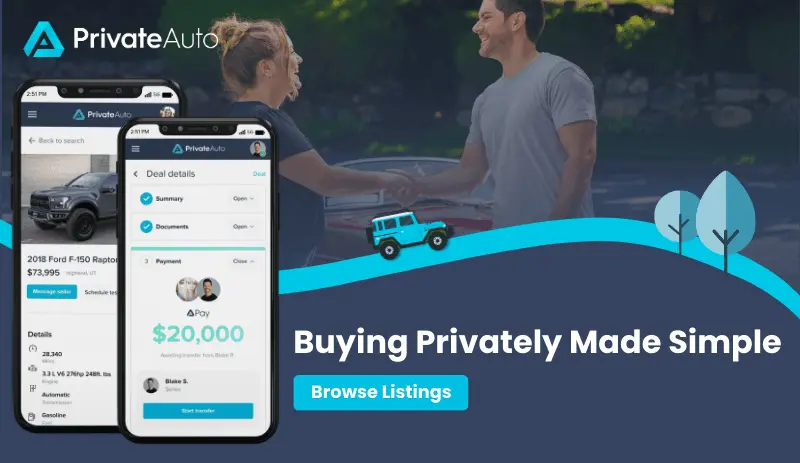Should I Buy from a Dealership or a Private Seller?
We’re big fans of the private seller route for the following reasons:
1. You drive the deal on your terms. PrivateAuto allows you to make offers and negotiate the best deal directly with the seller.
2. Get a better price by cutting out the middleman and going straight to the source. Dealers must buy low and sell high to make a profit and keep the lights on. You don’t need to fund them.
3. Avoid pesky dealer fees. Car dealerships charge documentation fees that range from $50 to over $1,000.
4. Enjoy security and convenience when you do the deal with PrivateAuto. Our transactional marketplace gives dealer-like convenience in the palm of your hand. From scheduling the test drive to sending instant payments, you’ll love how easy the process is.

1. Find a car
Step 1: Browse Used Vehicles Online
- Online classifieds
- National classifieds such as Craigslist and OfferUp.
- Local classifieds such as KSL Cars.
- Vehicle listing sites such as Autotrader.
- Social media listings.
- Auction websites such as Cars and Bids and Hemmings.
While these websitesplaces help you find used cars in your area, all of them lack transactional capability. We call them “meetingplaces” because they leave you to your own devices when it comes down to closing the deal.
Another major downside to most of these websites: they mix dealer inventory with private-party cars. Most of them don’t have an easy way to filter by private-party vehicles, so you’re left burrowing through a glut of dealer listings to find the private offerings.
We’re the world’s first and only fully transactional marketplace, offering self-service technological solutions for every stage of the deal.
We have nothing against other listing sites. If you find your car on one of them, we’re happy for you. But we still want you to have the transactional security and convenience that our users enjoy.
That’s why DealNow was created. DealNow is the easiest way to close your own vehicle deal, anytime. It’s the safe and simple way to avoid fraud, sign documents, and instantly transfer money, all in one app. Invite the seller to DealNow and fast-track your transaction.
Step 2: Negotiate a Price
On other sites, you’d have to message the seller and have an awkward conversation. PrivateAuto lets you make an offer with the click of a button. The seller can then accept, reject, or counteroffer.
2. Research the car
Step 3: Vehicle Research
We have partnered with AutoCheck to provide vehicle history reports on premium listings. AutoCheck gets its data from the following sources:
- Insurance companies.
- Vehicle inspection and state inspection stations.
- Import and export companies.
- Collision repair shops.
- Service records from maintenance facilities.
- OEM manufacturers.
- Salvage auctions.
- Car dealerships and extended warranty companies.
- Auto auctions.
- State Departments of Motor Vehicles (RMVs).
- Rental and fleet companies.
Doing an AutoCheck on a vehicle uncovers valuable insights into the car’s background.
- Regular maintenance (or lack thereof).
- Title history: flood damage, salvage titles, junk titles, hail damage, storm damage, fire damage, and more.
- Emissions records.
- Odometer rollback.
- Structural or frame damage.
- Service, repair, and maintenance performed.
- Total loss and reason for the loss.
- Lien information, ownership transfers.
- Manufacturer buybacks or lemon titles.
- Collision repair history.
- City and state of previous registration, number of owners.
- Accidents and damage reports, stolen vehicles.
- Rental, taxi, lease, or government use.
- Stolen cars.
- Major repairs.
- Open recalls.
- And lots more…
4. Inspect the car
Step 4: Meet Up for the Test Drive
Other marketplaces force you to exchange contact info with the seller and have a back-and-forth conversation about scheduling. Your privacy is compromised, and you waste a lot of time.
We keep your sensitive info private and secure. All communication happens through our secure messaging system. Our in-app scheduler makes it easy for you to schedule the meetup: just select from the seller’s available times and show up at their designated location.
Step 5: Vehicle Inspection
Here are some of the things to inspect:
- Undercarriage: inspect the car for leaks, rust, and damage. Look at brake lines, exhaust, and suspension components.
- Body: check for obvious damage, body panel alignment, uneven gaps, mismatched paint, and signs of damage repair. Look closely for any indications of collision repair. Check for rust underneath and around various body panels. Check headlights, brake lights, and other lights.
- Tires: examine tire treads and make sure there is sufficient tread depth. Also look for any cracks, bulges, or other tire damage. Check the spare as well.
- Maintenance records: review the vehicle history report and check maintenance logs to understand repair and ownership history.
- Interior: ensure all controls, electronics, air conditioning, and heating work properly. Look for any warning lights on the dash when the car is started. Check for water damage, stains, or tears inside.
- Fluids: check all fluid levels, including engine oil, transmission fluid, brake fluid, power steering fluid, and coolant. Look for leaks and make sure the fluids look clean and at proper levels.
- Test drive: drive the car under different conditions to test acceleration, braking, steering, and transmission, and to feel and listen for any mechanical issues.
5. Sign the bill of sale
Step 6: Sign a New Jersey Bill of Sale
Here are the necessary elements in a bill of sale:
- Date of the transaction.
- Price of the car.
- The make, model, and year of the car.
- A description of the car.
- Your full name and notarized signature.
- The other party’s full name and notarized signature.
- A warranty disclaimer stating the car is being sold as-is.
PrivateAuto provides an official New Jersey bill of sale as part of our standard in-app transaction process. At the appropriate stage of the transaction workflow, the buyer and seller will be asked to sign the New Jersey bill of sale electronically in the PrivateAuto app.
6. Pay the seller
Step 7: Pay for the Car
You can send unlimited funds to the seller with no transfer fees. Holidays, weekends, or nights—anytime. The seller will receive the money immediately. It’s convenient, secure, and most importantly, easy to use. Its instantaneous nature provides escrow-like safeguards for you to control the deal.
If you are not in a situation where you can pay cash for your next car, you can apply for a used car loan directly through the PrivateAuto app. When your application is approved, your profile will show that you have verified funds, which will set you apart from other buyers.
Our lending partner will pay the seller in full when you close the deal and send payment. You will make monthly car payments to the lender. It’s that simple. Curious how much your payments will be? Our car loan calculator will tell you.
7. Have the seller sign over the title
Step 8: Sign the Title
Both parties need to fill out the title certificate thoroughly. The following info is required:
- Names
- Addresses
- Signatures
- Vehicle identification number (VIN)
- An odometer disclosure statement (in many states)
- Damage disclosure statement
Odometer Disclosure
If in doubt, you could always complete the Federal Odometer Disclosure Statement to make sure your bases are covered.
Inspect the odometer to verify that the seller’s entry is correct. Keep in mind that sellers who tamper with a car’s odometer to obtain a false reading can face serious consequences.
The PrivateAuto app has a field for the odometer reading so that both the buyer and the seller can check the mileage before moving forward.
Vehicle Identification Number Check
The PrivateAuto app has a field for the VIN, where both the buyer and seller can check it for accuracy. This helps to eliminate errors (or the rare case of outright seller fraud).
8. Get insurance
Step 9: Get Car Insurance
PrivateAuto makes it easy to compare rates and get car insurance right in our app.
9. Register and title the car in your name
Step 10: Finalize with New Jersey MVC
They will require the following:
- The Certificate of Title, signed over to you by the previous vehicle owner.
- A completed Vehicle Registration Application (Form BA-49)
- Payment for New Jersey’s vehicle title transfer fee: $60.
- Payment for New Jersey vehicle registration fee: from $46.50 to $84 (depending on the type of vehicle).
- Payment for the standard New Jersey license plates: $6.
- Payment for New Jersey vehicle sales tax: 7% of your vehicle’s purchase price.
- Valid ID, driver’s license, or other proof of identity.
- Lien information (if there is a lien holder on the title).
- Proof of insurance.
- Proof of emissions testing.
- Completed odometer disclosure statement (if applicable).
License Plates
New Jersey Emissions Testing
- Gas-powered cars model year 1995 and older with a GVWR 8,500 pounds or less.
- Gas-powered cars registered passenger model year 2007 and older with a GVWR of 8,501 to 14,000 pounds.
- Gas-powered cars model year 2013 and older with a GVWR of 14,001 pounds or more.
- Historic motor vehicles.
- Approved Collector Vehicles which are less than 25 years old
- 100% Electric vehicles.
- All diesel-powered vehicles with a gross vehicle weight rating (GVWR) of 8,501 to 17,999.
- All diesel-powered vehicles model year 1996 and older.
If the car that you are buying does not meet any of these criteria, find a local NJ MVC-authorized emissions check station and proceed with the test.
For the locations of smog check stations, visit the New Jersey MVC website.
For most cars, the fee for performing this test will be $50.
New Jersey Vehicle FAQ
What are temporary plates?
A temporary license plate (or “temp tag”) can be acquired at the MVC. These temporary vehicle tags are typically valid for 30 days and cost $5, during which time you can apply for and renew your original license plate.
How to request a duplicate title in New Jersey?
If you’ve damaged or lost your car’s title, you will need to request a duplicate title from your local NJ MVC by submitting the following:
– The application for a duplicate certificate of ownership (OS/SS-UTA)
– A valid registration or insurance document, such as:
– A statement from the lien holder if the vehicle has a lien that includes:
– The vehicle’s VIN, make, and year
– The name of the vehicle owner
– A statement that discloses you don’t possess the original car title and that the car’s loan is paid in full.
– The NJ duplicate car title fee of $60
Is there a lemon law in New Jersey for used cars?
The lemon law in the state of New Jersey applies only to used cars purchased from a used car dealer.
Helpful Resources
Popular Cars For Sale

Landon Epperly
Contributing Author
Landon Epperly is the Product Manager at PrivateAuto, where he thrives on turning innovative ideas into reality. With a deep passion for cars and boats, Landon combines his love for vehicles with his expertise in product development to enhance the online marketplace experience….


